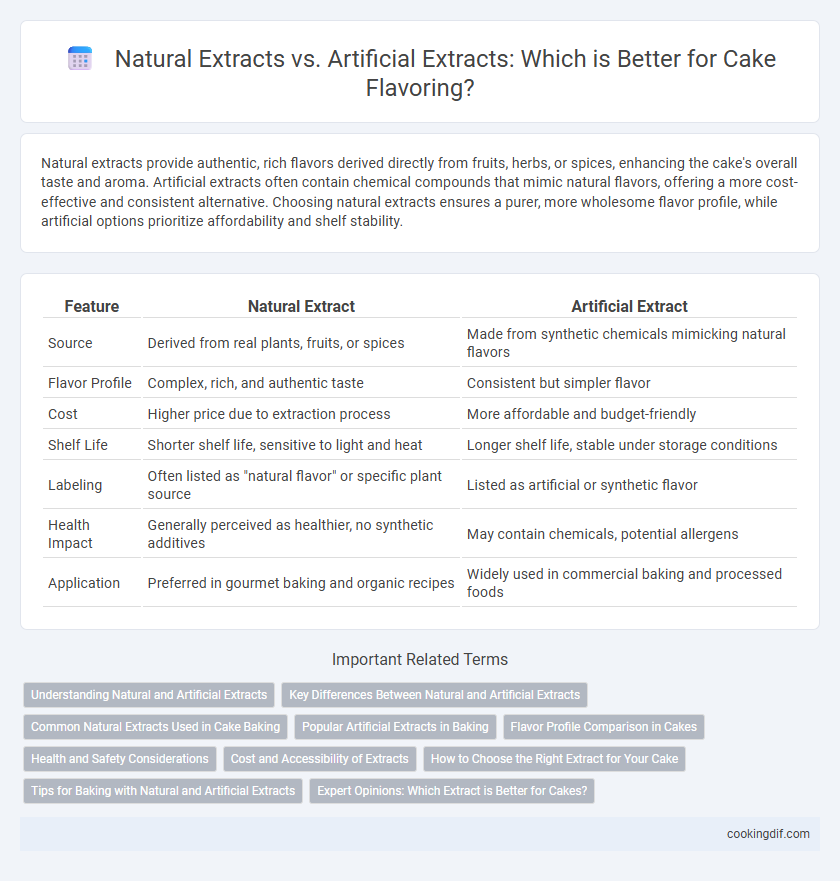Natural extracts provide authentic, rich flavors derived directly from fruits, herbs, or spices, enhancing the cake's overall taste and aroma. Artificial extracts often contain chemical compounds that mimic natural flavors, offering a more cost-effective and consistent alternative. Choosing natural extracts ensures a purer, more wholesome flavor profile, while artificial options prioritize affordability and shelf stability.
Table of Comparison
| Feature | Natural Extract | Artificial Extract |
|---|---|---|
| Source | Derived from real plants, fruits, or spices | Made from synthetic chemicals mimicking natural flavors |
| Flavor Profile | Complex, rich, and authentic taste | Consistent but simpler flavor |
| Cost | Higher price due to extraction process | More affordable and budget-friendly |
| Shelf Life | Shorter shelf life, sensitive to light and heat | Longer shelf life, stable under storage conditions |
| Labeling | Often listed as "natural flavor" or specific plant source | Listed as artificial or synthetic flavor |
| Health Impact | Generally perceived as healthier, no synthetic additives | May contain chemicals, potential allergens |
| Application | Preferred in gourmet baking and organic recipes | Widely used in commercial baking and processed foods |
Understanding Natural and Artificial Extracts
Natural extracts are derived from real plant sources such as vanilla beans or citrus peels, containing complex compounds that provide authentic flavors and subtle aroma profiles. Artificial extracts use synthesized chemicals designed to mimic natural flavor molecules, offering cost-effective and consistent taste but sometimes lacking depth and nuance. Understanding these differences helps bakers select the appropriate extract to achieve desired flavor intensity and quality in cakes.
Key Differences Between Natural and Artificial Extracts
Natural extracts are derived from real plant sources through processes like distillation or solvent extraction, preserving authentic flavors and complex aromatic compounds. Artificial extracts are chemically synthesized to mimic natural flavors, offering consistent taste profiles and longer shelf life but often lacking the depth and subtle nuances of natural extracts. Natural extracts typically contain additional beneficial compounds such as antioxidants, while artificial extracts focus solely on replicating the primary flavor components.
Common Natural Extracts Used in Cake Baking
Common natural extracts used in cake baking include vanilla, almond, and lemon, prized for their rich, authentic flavors derived from real plant sources. These extracts provide a depth of taste and aroma that artificial alternatives often lack, enhancing the sensory experience of cakes. Sourcing high-quality natural extracts ensures purity and consistency, contributing to superior flavor profiles in baked goods.
Popular Artificial Extracts in Baking
Popular artificial extracts in baking include vanilla, almond, and lemon extracts, known for their consistent flavor and long shelf life. These synthetic compounds are often preferred for their affordability and stability compared to natural extracts, which can vary in potency and cost. Artificial extracts deliver strong, reliable flavor profiles that enhance cakes and other baked goods without the unpredictability of natural ingredient variations.
Flavor Profile Comparison in Cakes
Natural extracts in cake flavoring offer a richer, more complex aroma with nuanced floral or fruity notes that enhance the overall taste profile, while artificial extracts tend to provide a more intense, singular flavor that can sometimes taste synthetic or overly sweet. The volatile compounds in natural extracts contribute to a dynamic flavor evolution during baking, creating depth and authenticity in cakes. Artificial extracts, composed of chemically synthesized flavoring agents, ensure consistency and cost-efficiency but may lack the layered sensory experience found in natural alternatives.
Health and Safety Considerations
Natural extracts in cake flavoring contain fewer synthetic chemicals and often possess antioxidant properties, contributing to a healthier option with reduced risk of allergic reactions. Artificial extracts, while consistent in flavor and cost-effective, may contain synthetic additives and preservatives that some studies link to potential health concerns and sensitivities. Choosing natural extracts supports safer consumption, especially for individuals with food sensitivities or those seeking organic ingredients in baking.
Cost and Accessibility of Extracts
Natural extracts, derived from real fruits, herbs, or spices, often carry a higher price due to the intensive extraction process and limited raw materials. Artificial extracts, synthesized chemically, provide a cost-effective alternative with consistent flavor profiles and greater availability year-round. Bakers prioritize artificial extracts for large-scale production because they ensure reliable supply and reduce overall ingredient costs.
How to Choose the Right Extract for Your Cake
Choosing the right extract for your cake depends on flavor authenticity and dietary preferences; natural extracts derived from real plant sources offer richer, more complex taste profiles while artificial extracts provide consistent flavor at a lower cost. Consider the impact of natural extracts on the overall ingredient list for clean-label baking and the potential for allergens or sensitivities in artificial alternatives. Prioritize natural vanilla, almond, or citrus extracts when seeking depth in flavor, reserving artificial options for budget-friendly or less prominent flavor enhancements.
Tips for Baking with Natural and Artificial Extracts
Natural extracts, derived from real fruits, herbs, or spices, offer rich, authentic flavors that can intensify the taste of baked goods but require careful measurement to avoid overpowering the cake. Artificial extracts provide consistent flavor and longer shelf life, making them ideal for recipes needing stable taste profiles under varying baking conditions. To maximize flavor, incorporate natural extracts toward the end of mixing to preserve volatile compounds, while artificial extracts can be added earlier for uniform distribution.
Expert Opinions: Which Extract is Better for Cakes?
Experts emphasize that natural extracts, derived from real fruits, herbs, or spices, provide richer, more authentic flavors in cakes compared to artificial extracts, which rely on synthesized compounds. Natural vanilla extract, for instance, contains vanillin alongside other complex molecules, enhancing depth and nuance in baked goods. However, some bakers prefer artificial extracts for consistency, cost-effectiveness, and stronger flavor intensity, especially in large-scale production.
Natural extract vs Artificial extract for flavoring Infographic

 cookingdif.com
cookingdif.com